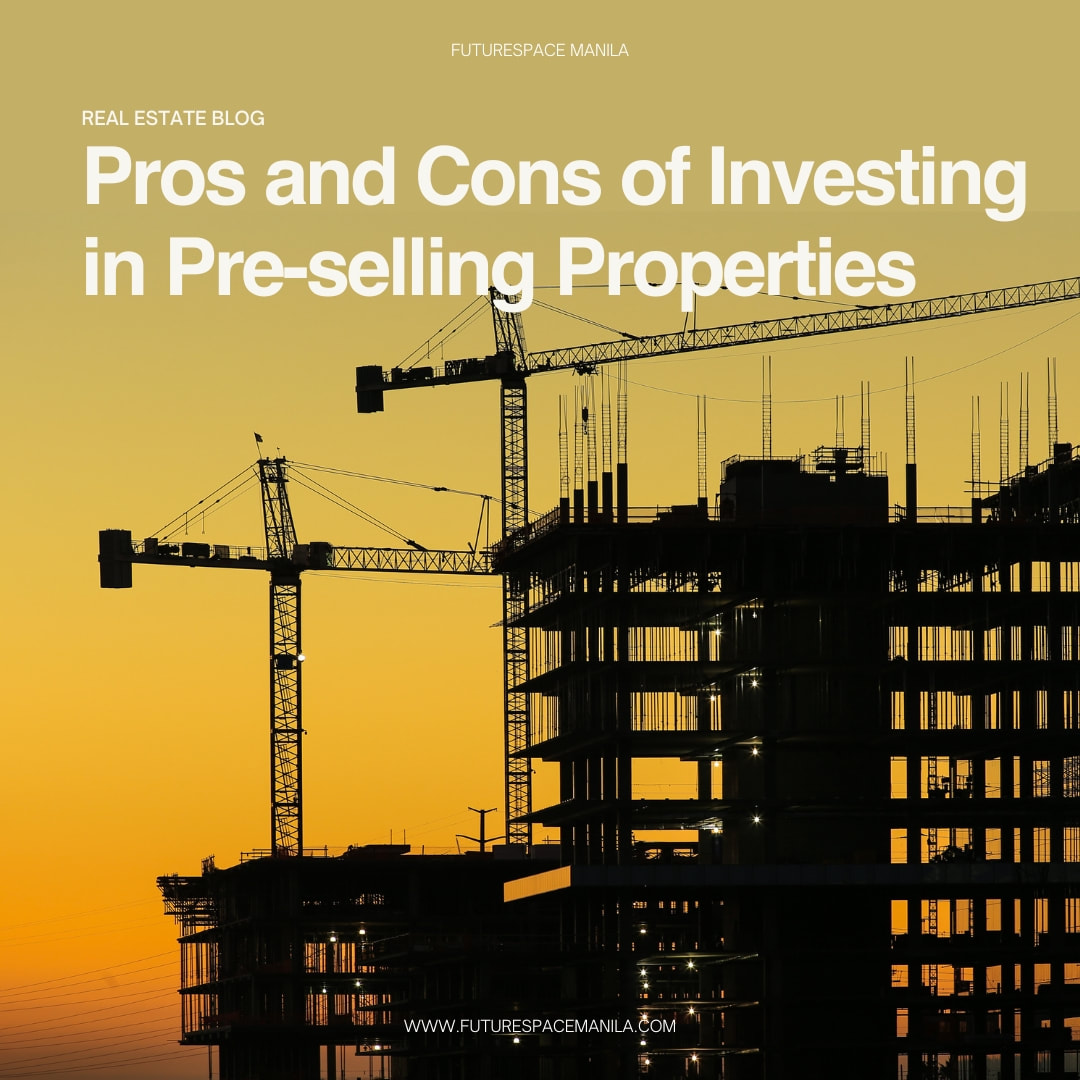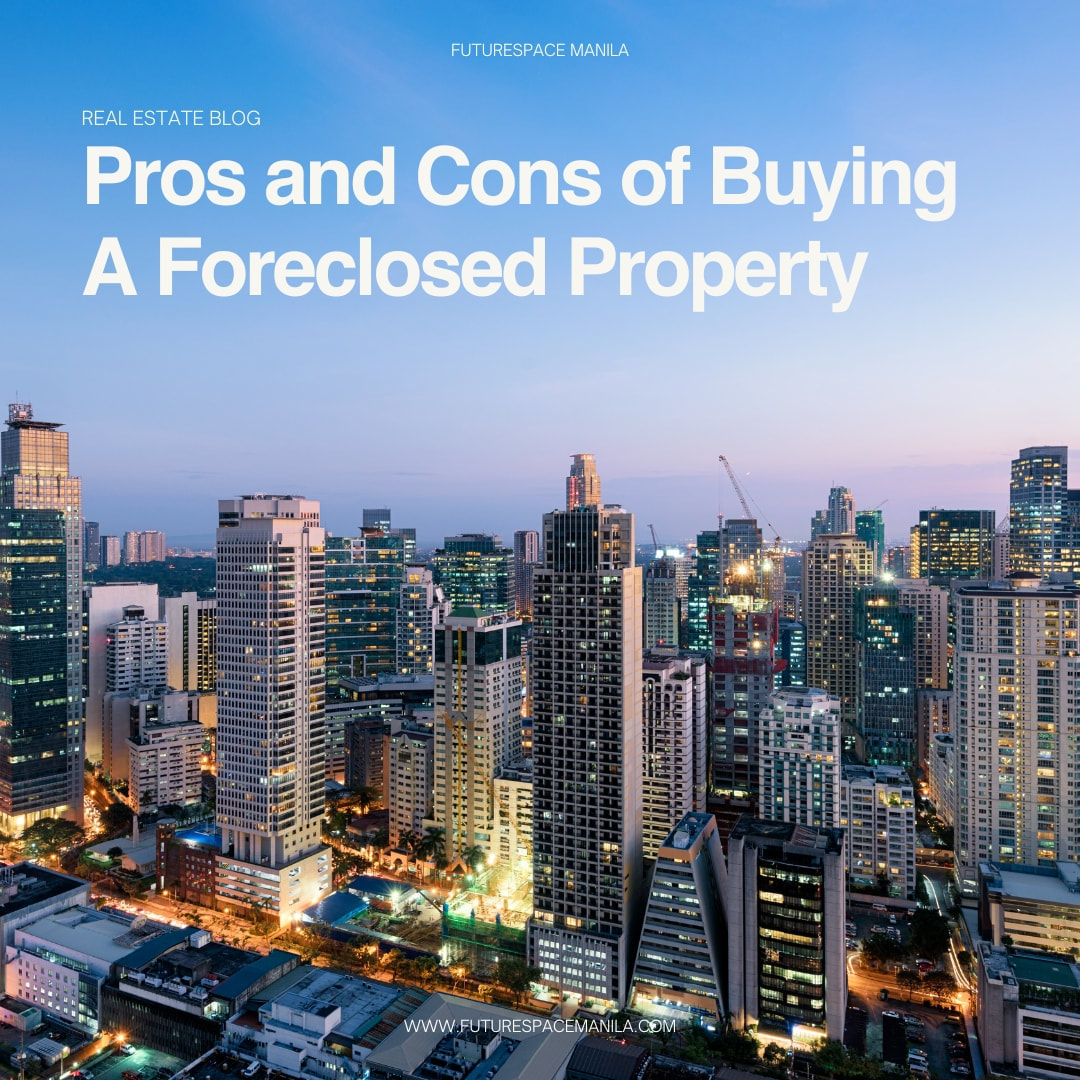|
Pre-selling properties is a common term in the real estate industry. Whether for a first time homeowner or a long-time property investor, pre selling condos or pre selling units are good value for money investments because the properties are sold under market value. Pre selling properties make asset acquisition affordable with a increased chances of generating revenue.
What are pre-selling properties? A pre-selling unit or property, whether a townhouse, condominium, or house and lot, are residential real estate properties sold by a develop prior to its completion. Also called "off-the plan properties," a pre selling property at a pre selling stage is released to the public during the time it could be undergoing construction phase or while it is in its planning stages. This means that prospective investors are presented with the blueprint of the pre selling condos or only the a model showroom of the unit. This investment scheme allows property developers to finance the construction of the project at the same time making property purchase for investors affordable. However, studying the potential risks and rewards of pre-selling properties is highly recommended prior to placing your down payment. Pros of Buying Pre-selling Properties Lower introductory price than ready for occupancy units Pre sold properties tend to cost less than purchasing finished units. Low budget investors can be easily turned off by ready for occupancy properties which is why a pre selling property can put an investor at an advantage due to its affordable introductory price. Since the property does not exist as at the time of purchase, a pre-selling property can cost 30% less than the price of a ready for occupancy unit. It is important to remember that the price is affected by different factors such as location, size, amenities and the credibility of the developer. Flexible Payment Schemes Pre selling units are popular among buyers because its developers offer flexible payment options that make it convenient for investors to meet their monthly payments, often times without interest. Developers can even extend discounts on down payments and offer in-house financing options. Choose the Best Unit Option One of the most salient advantages of buying a unit in pre selling project is having the freedom to select a unit that's most suitable to your lifestyle. Buyers can view model units of a pre selling condo and be assured they will be near basic amenities or check unit sizes and opt for ones with bigger cuts. A Promising Investment While investors have to patiently wait until a pre selling property is completed and ready for use, they can be assured of a future profit. Properties appreciate over time and once the developer completes projects, properties' value rise. This means when you purchase pre selling units, you buy at a lower price and have the option to sell it or rent it out to earn passive income. Cons of Buying Pre-selling Properties Delay in Turnover Date Among the risks of investing in pre selling condos is the possible change of date in turnover. While the target completion date is disclosed to buyers, a lot of factors can cause adjustments to this crucial date. Pre sale contracts often include delay clauses which buy developers extra time to deliver for up to a year or more. Changes Without Prior Notice The pre selling contract would commonly state that the property will be constructed with specific finishes and materials. It would be wise to have awareness that the property developer still has the right to make alterations in the finishes and materials in certain circumstances without compromising quality. It is important for buyers to know that there can be changes in unit sizes, floor plan, finishing, features, or amenities. Failure of Property Completion Another big risk in pre selling property investments is that investors may not get a refund for a deposit or downpayment in case the pre-selling project fails to be completed or if the developer undergoes a financial crisis or bankruptcy. This is why buying from a reputable developer is important. Always consider the reputation of the developers. Research and know the projects they have completed and strive to know their track record in delivering quality properties. One key thing to know is if they have the license to sell pre selling real estate properties. Key Takeaways Acquiring any real estate property involves a big financial decision. Investing in a property during its pre-selling stage is no exception to this. It is important to have enough details about both the developer and the project, to triple check your financial means, and to not rush into pre-selling contracts at once. When in doubt, it is highly recommended to seek the services of a registered and licensed real estate broker to help you negotiate and assist you in the purchasing process.
0 Comments
Investing in a property, whether you're a first-timer or a seasoned investor, can be a rollercoaster ride filled with wins and setbacks. Buying a property that's foreclosed is not an exception to this journey. But if you're keen on a home or property that suits your budget and style—and it happens to be a foreclosed home— then it might be worth considering.
Prior to proceeding, however, learning about the foreclosure process and the pros and cons involved in buying a foreclosed home can help you decide if it's the right property investment for you. What are Foreclosed Properties? A property or home enters the foreclosure process when its homeowner falls behind their home or mortgage loan payments. Properties can also become foreclosed properties if the homeowner fails to pay real property tax from the government. When this happens, the bank or mortgage lender can takeover the home. What is the Foreclosure Process? Buying foreclosed homes may seem like an affordable and convenient way to own a property. But it's best to know the stages of the foreclosure process first prior to purchasing foreclosed properties. The three stages in the process are: the pre-foreclosure, the foreclosure auction, and the post-foreclosure. Note that any interested buyer may purchase the foreclosed property any time during those stages. However who the buyer purchases the property from may change throughout the process. Buying a home in the pre-foreclosure stage will entail buying from the homeowner. This will allow them to avoid foreclosure. A buyer will purchase the home from the bank or mortgage lender if they buy within the foreclosure auction and the post-foreclosure stage. Pre-foreclosure This stage starts when the homeowner significantly fails to follow through their mortgage payments or property taxes and the foreclosure proceedings have been initiated by the bank or lender. The homeowner will be selling the property less than the real estate market value or less than the amount owed to complete the mortgage loan. This is referred to as a short sale. Foreclosure Auction At this stage the title of the foreclosed home has likely been transferred to the lender or the bank. A property in active foreclosure will be put up for auction and sold to the highest bidder. Note that the bank or lender can sell the foreclosed homes at this stage below market value so they can gain back their loss without putting the foreclosed property on the market. Post-foreclosure Buying foreclosed properties during this stage means that the property failed to sell during the auction. If so, the property is considered REO or a real estate owned property, meaning the bank or lender owns the property and will be accountable for its sale. REO properties are put on MLS or the multiple listing service. This is what a real estate agent uses to search and compare available properties. Pros of Buying Foreclosed Properties Lower price The most obvious advantage of purchasing foreclosed properties is their relatively low purchase price. Home buyers are in luck because lenders would typically be itching to get rid of a foreclosed home to cover their losses. Gain bargaining power Again, lenders and banks are often in a hurry to offload foreclosed homes as quickly as possible. They often pay the real estate agent’s commission and will negotiate other concessions on things like price, closing costs, and down payment. This puts a buyer at an advantage of bargaining for that they want. Flexible financing options Like buying non-foreclosed properties, a buyer can get regular mortgage financing in buying a foreclosed property. There are even foreclosed properties that have flexible financing options. Better ROI prospects Investing on a foreclosed property can turn out to be a good endeavor. The foreclosed home make take a few renovations or repairs, yes. But once done, you can rent out the property with the same amount landlords charge in the area. Cons of Buying Foreclosed Properties The foreclosed property will be sold as is Banks or lenders will not make repairs even if a foreclosed home needs it. This means a buyer will need to take home inspections seriously and decide if the property is worth the deal. Being in the as-is status means there won't be a home warranty. A buyer has no guarantee of protection if he discovers a health hazard or deficiencies in the property. Buying a foreclosed property while it is on auction means a buyer won't be able to inspect the property itself. Property repair and renovation costs The foreclosed home might have a lower price but the potential costs of repair work might undo just that. Depending on the interior and exterior condition of the property, a buyer should be ready to make a hefty investment. Longer process due to additional steps Original owners won't move out the same day you purchase a foreclosed property. The legal legwork might also take time considering the transfer of the title from the owner to the lender. A buyer should be ready to jump extra hoops before reaching final closing. A buyer has to confirm that the home title is free and clear once the closing is complete. Takeaways Foreclosed properties may be easy to find on the Internet. One can also be easily drawn to making a quick investment and save money due to the lower purchase price of foreclosed properties. But before anyone gets into the buying process, it would be wise to weigh the additional costs involved such as repairs and to do research on the value of other properties on the same location where the foreclosed property stands. "Rent to Own" is a highly used term that even real estate dummies or newbie homeowners have likely heard. The phrases "rent to own home" or "rent to own deals" might be heard in conversations among friends and relatives seeking rental properties near their work place, hoping to hit two birds with one stone by putting their monthly rent towards a down payment.
For anyone eager to kickstart their homebuyer's journey, entering a rent to own agreement or rent to own contract is an available alternative to purchasing a property. Read on below to get the basics the Rent to Own method of buying a property and figure out if it's the right purchasing scheme for you. To do that, you need to know the advantages and disadvantages of entering a rent to own agreement. What is Rent to Own? In a nutshell, a rent to own contract allows prospective buyers to lease or rent a property for a specific period of time with an option to buy it at a specified point in the future. A common appeal of the rent to own agreement is that part of the monthly rent is already put towards the purchase of the home, allowing a leaseholder to save on the down payment. The pay upfront is nonrefundable and often up to 5% of the purchase price of the property. How does Rent to Own work? A buyer will have to enter into an agreement with the seller wherein they establish the purchase price for the property in their rent to own contract. At a specified point in the future, the buyer can buy the property for that purchase price regardless of the property's worth. A buyer will pay a higher monthly rent and part of that money will be set aside by the owner toward acquiring property ownership. In time, the buyer gains equity. This makes getting a home loan easier since the equity will help reduce or eliminate the required down payment. Pros of Rent to Own Here at the biggest advantages of most rent to own agreements: You don't have to qualify for a home loan. With the rent to own method, prospective homeowners can buy a home with bad or zero credit. In the course of completing the rental period or monthly rent payments, buyers can work towards rebuilding their credit score and can eventually get a load once it's time to buy the property. Agree on a purchase price and lock it in. Given the ever increasing home prices in the market, rent to own agreements allow buyers to purchase a property at its current price. This take the anxiety out of letting prices go up in a prime area as a buyer puts off or saves up for a down payment. Buyers also have the option to back out if home prices fall although this will depend on how much they have paid under the lease purchase agreement. PRO TIP: Purchasing a property directly from a developer puts a buyer at an advantage of getting the property while on promotion rate. No war bidding with other prospective buyers. Signing lease purchase agreements gives buyers the right to the house as long as they comply with the rent to own contracts' terms. They don't have to worry over losing to another interested party so long as they stay on top of their monthly payments. Experience living in the property prior to owning it. A rent to own deal permits buyers to take the property on a test drive before committing to purchase the property. This will give them the time to learn about the property's issues and other problems so solutions can be addressed by the owner. Cons of Rent to Own The rent to own lease option agreement does have its flaws. Find out below if the disadvantages outweigh its benefits. Prepare to pay a higher rent. Rent to own homes have trouble attracting buyers due to high monthly rent they entail. This is due to the fact that the owner has to set aside some of the money from the monthly payment to assist a buyer in building equity. Expect maintenance costs and other fees to go up. Buyers usually have to pay an upfront fee as soon as they get into a rent to own contract (and prepare for a refund should things go south). They too will have to shoulder repairs and maintenance expenses and be prepared to shell out money for unexpected emergencies. Other concerns might also come up along the way such as title issues of the property. Make sure to stay on top of a property's documents before committing to it. Risk of losing equity. You could be religiously honoring your rent to own monthly payments but if the owner is less than responsible in staying on top of their mortgage payments, this puts them and you at risk of losing the property through foreclosure. Buyers could also be forced to incur legal bills if the seller tries to back out of the contract after you've already spent the money. Late payments and failure to meet contract requirements can put you at financial and legal risk. Depending on a buyer's agreement with the owner, not paying rent on time puts a buyer at risk of losing the right to the property along with previous additional payments. If the agreement is a lease purchase instead of a lease option, a buyer could also lose more than the money already paid. The failure to meet deals as states on the contract could leave a buyer with a costly legal bind. Takeaways The downsides of rent to own deals can make it a risky method. Be forewarned that scams are rampant and can take advantage of those with poor credit score. Despite engaging with an honest owner or seller, the volatile economy might still put a buyer at risk too of a possible forfeiture of the property when things don't go as planned. It is best to consult with a real estate lawyer before entering any rent to own agreement. |
Categories
All
Archives
January 2024
|




 RSS Feed
RSS Feed